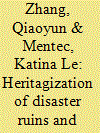|
|
|
Sort Order |
|
|
|
Items / Page
|
|
|
|
|
|
|
| Srl | Item |
| 1 |
ID:
181918


|
|
|
|
|
| Summary/Abstract |
Previous studies on disaster aid emphasize on how aid as gift forms hierarchical relations and thus perpetuates political and symbolic domination. This article, however, highlights the diverse possibilities and capabilities emerged in disaster aid. Based on a 15-month fieldwork, the authors focus on the ethnic minority Qiang’s post-earthquake experience throughout the unprecedented aid and state-sanctioned ‘Gratitude Education’ campaign. This article argues that the moral obligations of gratitude enabled the Qiang’s competition for tourism, education, and other public service resources despite submitting to a seemingly imbalanced power relation in the multi-ethnic region of southwest China. The article further argues that ethnic governance in China is structured on the entanglement of gift exchanges, state control, inter-ethnic competition, and the in-betweeness of ethnic members, which can be problematic yet productive.
|
|
|
|
|
|
|
|
|
|
|
|
|
|
|
|
| 2 |
ID:
156522


|
|
|
|
|
| Summary/Abstract |
This article discusses state-led heritagization processes in Beichuan and Wenchuan Counties, two Qiang ethnic minority areas severely affected by the 2008 Wenchuan earthquake (China). Certain destroyed landscapes were preserved and turned into earthquake relic sites. In particular, the former Beichuan County seat was entirely heritagized for memorial, economic, and patriotic education purposes, causing an emotional conflict with locals still affected by loss and trauma. At the same time, Qiang cultural practices were hastily registered as national and international intangible cultural heritage, while reconstructed Qiang villages were transformed into heritage tourism destinations. These initiatives tend to reshape Qiang culture elements into fetishized commodities. Allocating massive funds to historically marginalized regions, these post-disaster heritagization programmes aimed at boosting economic recovery, as well as demonstrating state power, national unity and solidarity. Implemented using a top–down method, they appear insensitive to the affected population’s trauma and the sociohistorical context from which the newly heritagized elements originate. The disaster and Qiang culture heritage tourism not only failed to bring about sustainable economic development to the earthquake-stricken areas, but also ignored to a large extent the initial goal of ‘post-disaster cultural recovery’ and the virtues of cultural heritage in recovery processes.
|
|
|
|
|
|
|
|
|
|
|
|
|
|
|
|
|
|
|
|
|